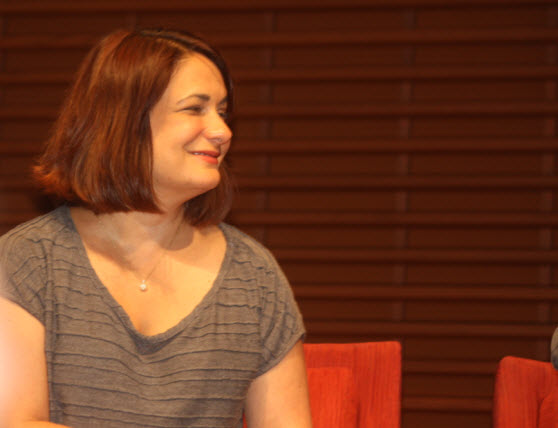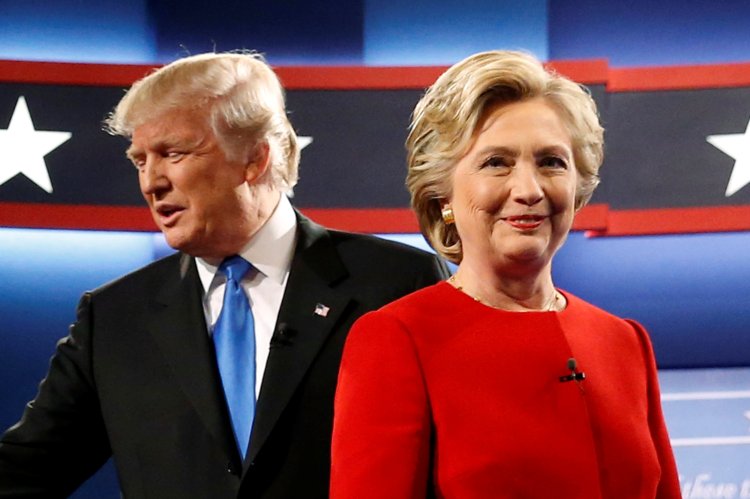Donald Trump has many targets for change, but he hasn’t drawn his cross hairs on the video game industry yet. In fact, it’s hard to see what kind of economic impact Trump’s presidency would have on the game business, as his economic strategies seem vague.
But everybody I’ve spoken with in the game industry has a strong opinion on Trump, and they’re worried about the uncertainty. I solicited some opinions from game industry leaders, and this column is about the impassioned responses that came back.
I asked what kind of impact Trump could have on the game economy, and how game companies should respond. I also asked how game people as artists should respond.
Some people are still keeping a sense of humor. Tom Kalinske, former head of Sega of America and chairman of Gazillion, said, “On a positive note, he’s such a caricature, might be fun to see how he appears in games.”
Here are some excerpts from a small group of responders. Thanks to everyone who participated.

Above: Kate Edwards of the IGDA and Stewart Rogers of VentureBeat.
Kate Edwards, head of the International Game Developers Association, called upon game developers to use their influence in creating art to make an impact on society.
First and foremost, the game industry needs to engage the new administration and do whatever we can to educate, inform, and enlighten the incoming president on the importance of our profession, both creatively and economically.
At this point, it’s not easy to discern what the precise economic impacts will be. However, listening to the feedback from many U.S.-based game developers, I know there is a very real concern about the removal of key programs, such as the Affordable Care Act (ACA), which would remove a viable health insurance option for independent developers, freelancers, and contractors — all of whom comprise a significant portion of our industry.
Working through existing channels would make most sense, namely the ESA from a trade/company perspective and through the IGDA from a professional/worker perspective. Ideally, we can work in tandem to bring a stronger voice. That being said, I still encourage every U.S.-based developer to speak up, engage their local representatives, and help educate the political system on the importance of game development. From my own conversations with politicians, one thing they value most is hearing directly from those people who are engaged in the work, and when they understand what we actually do, it can positively change their perception.
I don’t see the shift of a presidential administration as any deterrent to the practice of our craft, and we as game developers should continue to boldly and unapologetically make whatever games we are wanting to make.

Above: Michael Pachter of Wedbush Securities.
Michael Pachter, analyst at Wedbush Securities, looked at Trump’s impact from a purely economic view.
I expect no impact whatsoever. His “Make America Great Again” mantra is to bring manufacturing jobs back. It’s not like EA “exported” FIFA development to Canada, they’ve been doing it for years. They didn’t “export” Battlefield jobs to Sweden, but instead bought DICE 10 years ago. Activision didn’t “export” Candy Crush to Sweden, they bought King.
I haven’t really seen much job migration away from the U.S. in the last decade. Yes, there are fewer studios, but there are fewer games made (remember THQ, Midway, Atari, Acclaim, 3DO?). If anything, most publishers have increased jobs in the U.S. (Take-Two with Hangar 13 is a good example). Publishers hire where the talent is, and there is great talent both in the U.S. and abroad. I don’t see anything coming from a Trump presidency that materially affects the industry.

Above: Dmitri Williams, associate professor at USC.
Trump’s divisive politics around race and women made a big impression on Dmitri Williams, associate professor at USC and a game industry executive. He said that his problem with Trump’s campaign was the “marginalization and demonization of people of color and his disrespect of women.” On this front, Williams felt the game industry was complicit over the years.
Developers wield power, but they’ve largely failed to represent all of America in games. In 2009, I published a deep and comprehensive analysis of representations in games by gender, age, and ethnicity. We found that the world of games looked very little like the US. There are large gaps between game character populations and the US census. It was the equivalent of the #oscarssowhite results, but it was more #gamessowhitemale. What we found was that the world of games looks very much like the demographics of game developers. There’s no evil conspiracy here; basically, people make games that look like them.
Unfortunately, game developers don’t look like America. Not yet, anyway. As a result, games systematically underrepresent Latinos, blacks (except in sports games), women, and the old and young.
The most powerful thing the industry can do is to send a strong message of inclusion by, well, including everyone. I was part of a DICE panel on this in 2010, and I’ve never seen an audience empty out so fast. No one wanted to be lectured to or to feel bad, so they didn’t stay to see the data. It’s not just a moral imperative — it’s a missed market opportunity when minorities are underserved. If nothing else, green should be a uniting color.
This election shows that the industry needs to play its part in representing the entire country. As Kate said, these things absolutely matter and developers have immense cultural power. If you’re asking “what can we do?” the simplest answer is make games that look like all of America.
Adam Creighton, general managerPanic Button:
[As for the impact on art], this is going to be interesting. There are a ridiculous number of ridiculously important social issues that humanity — forget just game devs — need to tackle. Artists are often on the forefront of tackling those issues in ways that help us all look at those things in new, less dismissable ways. Game development is a global industry, a global community. We have these massive, global, social and economic issues. And this U.S. election, I think, I hope, has shined a light on a whole of bunch of issues for U.S. game developers.
These are global, real, issues, but were — I don’t know — maybe theoretical to some U.S. game industry folks, and now there’s no escape; they’re real, they’re in our face, and we need to tackle them head on. Another thing I think will be interesting coming from how game makers as artists responding to the recent election is the obvious, deep, disconnected social and ideological division between people in the U.S., and worldwide.
Not just the election results, but ‘How did we even get here?’ — Two candidates that are far-from-universally accepted by their respective parties. Two main parties that are far-from-universally accepted by their respective constituents. A whole political process in the wake of this that might not have all it needs to support change within it.
How will game developers as artists respond to these different viewpoints? These social and ideological schisms? I want know — How game developers as artists respond to people with deeply different viewpoints and values? What will be the artistic expressions that explore those? What will be the artistic expressions that hold world leaders accountable? The expressions that try to unify?
And which artistic expressions and responses to this week’s election will make things markedly worse?
I’ll tell you, in the wake of this week, in the social media space, I’ve seen and heard way more bad than good. I’ve heard way more division than reconciliation, and I’m in the game space, so I listen and watch all sorts of high-visibility people behave and say things in intolerant, grotesque ways that are more indicative of the troll template they’re spitting against.
But I know of people who are (mostly) quietly doing something positive in the wake of this week. Those game-developers-as-artists are putting effort into actually doing something, making something, in response to this week.

Above: Aaron Loeb at Kabam
Aaron Loeb, president of worldwide studios and live services at Kabam:
It is too early to tell what the impacts will be of the election. Here’s what we do know: As an industry, we’ve moved in the past 15 years from single-player experiences to live, 24/7 services with immense communities. That means that our games — not just Kabam’s but nearly everyone in our industry’s — are large-scale, social experiences where people from every country on the globe play together and talk to each other. In my alliance in Marvel: Contest of Champions, there are Trump supporters and Clinton supporters, and there are also Muslims from Pakistan and Indonesia. The Trump-supporting Marine in my alliance wished the Muslim members a blessed Ramadan earlier this year. As game makers, we have one of the surest and most direct paths to making sure that people who are different from each other get to know each other through play. We have an opportunity as game makers to tear down walls between people, and I think this is the most important work we can do in the coming days.
As to the economic impacts, our employees at Kabam, and really at every major game company, come from all over the world and are of every faith. Kabam has a deep and abiding commitment to diversity and will stand by our employees. We are now and will always be supportive of our Muslim employees, LBGTQ employees, and our many employees who are immigrants. That said, you asked about economic impacts and I want to be really clear about something: in tech, we hire some of the most talented and rarest individuals in the world. Someone who knows how to make a complex and scalable service is one-in-a-million, globally. People with that sort of talent will not live where they do not have civil liberties, where there is no art, and where those around them are oppressed.
For generations, people have come to the United States because it is the land of opportunity. Corporations are global now, and if a Trump administration seeks to implement some of the policies promised on the campaign trail — most particularly a national database of Muslims, or a severe crack-down on immigrants — every tech company in the world will find talent less likely to relocate to the United States and more likely to relocate to Canada or Europe. We are a talent-based industry, and just as you saw Germany advertising jobs in the post-Brexit UK, global talent will, if the United States abandons its ideals, start to move elsewhere.

Above: Mike Gallagher, CEO of the ESA
Mike Gallagher, CEO of the Entertainment Software Association, the game industry’s trade association:
Elections do not define our medium or our horizon — we do. Our industry is delivering greatness today — and has an exponentially growing ability to impact society inside and outside of government and elections. We have a proven track record of seizing opportunities and standing together against threats that goes back to the origins of interactive entertainment, whether it was the [game censorship Joe] Lieberman hearings 20 years ago, hostile state legislation in the late ’90s, fighting the U.S. Supreme Court case [on game violence] from California in 2010, or the misinformed 2012 post-Newtown backlash. This is a great industry filled with creative talent and ESA will be there to advance their collective interest at every turn and in every forum.
Gamers, developers and innovators should stay engaged by keeping up-to-date on policies and legislation affecting video games. And we encourage everyone to join with us at the Video Game Voters Network. The IGDA does an outstanding job of representing game developers. Sign up. Your voices matter. Your action affects change. Be involved!
Opportunity and risk are present in every election outcome. We have more than 150 million gamers in the US, and gamers vote by the millions. We have points of presence in more than 90 percent of Congressional districts. We have greater support from elected officials — federal and state — than ever in our history. We will continue to amaze — and together — deliver our own destiny.

Above: Margaret Wallace of Playmatics
Margaret Wallace, CEO of Playmatics:
The game industry is a microcosm for society as a whole. As with any transfer of power, it will be interesting to monitor policies around internet neutrality, free speech, international business, and also data collection and privacy. We ought to examine whether any major political donors, for example, have future influence in things like curbing online gambling. For example, consider that casino billionaire and major GOP donor Sheldon Adelson has devoted considerable time and resources to shutting down online gambling.
The realities of the 21st century will propel the game industry forward for making in-roads in ensuring that support for start-ups, content and career opportunities truly reach diverse groups.
I hope the new administration continues to work with the game industry in a similar way in which the Obama administration worked with the game industry to foster dialogue and discussion and to collaborate together on ways in which video games can be used for good, in addition to offering one of the most enduring and engaging forms of entertainment.
Playmatics plans to continue its focus on delivering engaging and maybe even transformative experiences for its players. We want to make games and other interactive stories and content that serve our players and communities all around the world. We just want to be that source of entertainment, escape or provide more potentially therapeutic, educational or health-related context.
We believe that games can be forms of art. It is the role of every artist — intentional or not — to hold up a mirror to society.
Nick Fortugno, cofounder at Playmatics:
Game makers as artists respond as all artists respond. We make work that speaks to the concerns and passions we have. We speak out against politics of hate. We make representations that elucidate hypocrisy and corruption. We create visions that inspire. We express our sense of what the country should be through our imagery and technique. To do anything less is to be silent in the face of immorality.

Above: Wanda Meloni of the Open Gaming Alliance
Wanda Meloni, executive director at the Open Gaming Alliance and analyst at M2 Research:
On Wednesday morning when the results were in I told my kids, and what I’m telling myself, is that we need to lead by example. Now, more than ever we need to bring our best selves to everything we are doing. It’s the same for the games industry, lead by example. We need to be teaching more and initiating a deeper dialog, especially with those outside our natural comfort zone.
It’s hard to know what the economic and social impacts of a Trump presidency will be. However, the hatred, bigotry, and misogyny present during the campaign is not tolerable and should not be acceptable to anyone. It comes from a place of fear, so we must lead through a place of strength, exude tolerance and embrace diversity. Entertainment, through games, film and music is able to bridge diversity better than any other form of communication. We have an opportunity to also education with compelling experiences in VR and AR. It is not just about games it is about digital media in all its forms.
The games industry has always pushed the boundaries of entertainment and technology, now we need to set standards and define best practices. There needs to be more resources allocated to supporting the industry. Full stop. I see countries like Canada, Finland, Sweden, Brazil, Argentina, Korea, Malaysia doing so much more than the US to support national and regional programs to educate, grow and retool their labor force. It’s not just about new entrants into the workforce. In places like Kuala Lampur the government has set up technical training centers for people coming from farming regions to learn Unity, digital production and animation. This is where the US could play a much larger role in rebuilding and retooling.
I think game makers need to keep making games. Especially games that educate, enrich, and connect people.
Steve Peterson, game designer and journalist:
I appreciate Kate’s sentiment, but I think that the history of games shows not very much ability to drive political change. The games with the greatest emotion have tended to be games with the smallest audiences — indie games, for the most part. The billion-dollar games with tens or hundreds of millions of players don’t deal with issues or deep emotions.
If game makers want to effect change, I think they should make great games and take some of the money they make from them and give it to groups with a proven ability to fight for causes they believe in.I don’t think it’s really possible to change more than a small percentage of people’s minds about political candidates or general political ideology. More people might vote against someone they once supported if they feel betrayed, if promises made were not kept. As to what we can do as citizens, trying to change minds en masse is probably not going to work very well. Organizing to get higher turnout is probably more achievable.
As artists, I think game makers should do as their spirit moves them. I do think that crude attacks and parody, while perhaps emotionally satisfying to the creator and funny to those with the same viewpoint, aren’t going to sway opinion to your side. If anything, that would harden opinion against you. More effective might be to show what someone goes through as the result of prejudice, or when they lose their health insurance, or suffer from the effects of coal mining. That can be done very well in the context of the right game, and would be a more effective way to get people on your side.
VentureBeat's mission is to be a digital town square for technical decision-makers to gain knowledge about transformative enterprise technology and transact. Learn More

